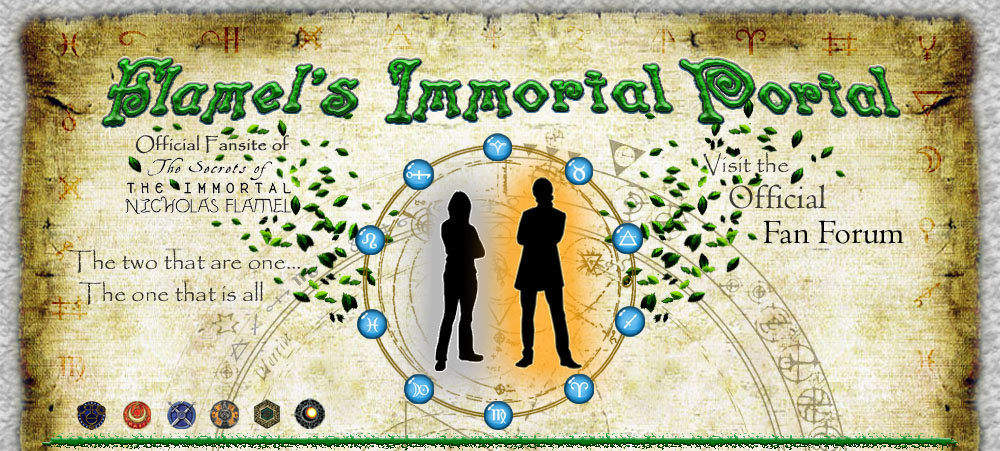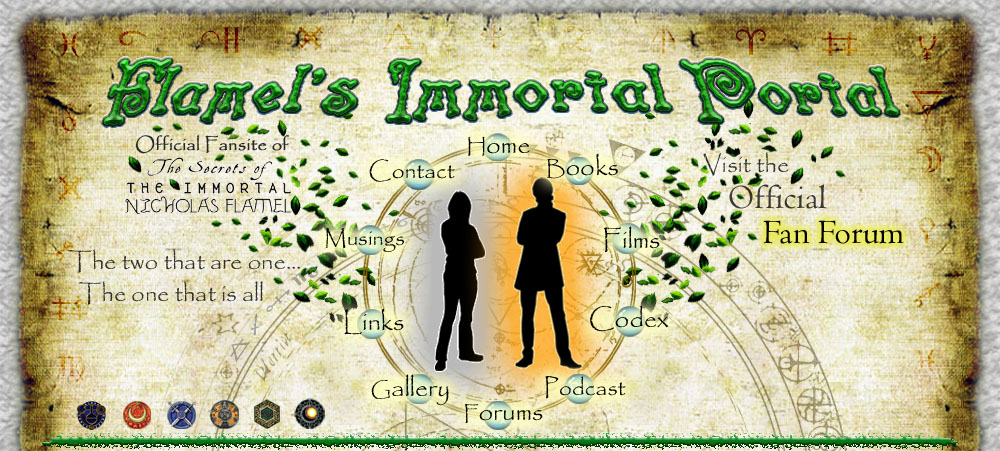| Home | l | Books | l | Films | l | Codex | l | Podcast | l | Forums | l | Gallery | l | Links | l | Musings | l | Contact |



|
Francis le Comte de Saint-Germain is certainly friendly and somewhat incorrigible. Perpetually youthful, handsome, gregarious, self-involved, and possessing brilliant blue eyes, he's more than a little bit mysterious. Born in eighteenth century France, his given name means 'Frenchman' and his surname, 'holy brother'. Not much is known yet of his life, but we do know that he was a student of the immortal Humani, Nicholas Flamel and according to Nick, possibly his best student ever. Historically speaking, Saint Germain was well travelled, an accomplished musician and singer, alchemist and immortal, a thief, a charlatan, a spy, and now we can add to that list that he's also husband, international rock star, and Master of Fire. How he became immortal as well as the Master of Fire is still a mystery. The Witch of Endor, Dora, knew the very first time they met in 1730s London that he was an immortal. He told her he'd learned it from Nicholas, of course. She didn't believe him possibly because she may have known the recipe the Flamels relied upon changed monthly. Then he said he'd learn the secret in Tibet, a secret which was not reliant upon a monthly recipe. She also doesn't like him, yet he is the one she contacted to come to the aid of the twins, Flamel, and Scatty. According to Francis, Dora was his 'old teacher' and that the reason she didn't like him was because he'd somehow managed to steal Fire magic from Dora's brother, Prometheus. So when and where did he discover the secret to immortal life? In the same place he learned to use fire? Well, he tells us he learned the secret to immortality in Tibet, that he'd met the mysterious hook-handed man in Ophir, India, who schooled Francis in fire magic. So let's see if we can connect Francis to either of those places. The famous Helena Petrovna Blavatsky said that the historical Saint Germain was her teacher/master. She wrote several books, one called Isis Unveiled, in which she appeared to write about Saint Germain: Helena was one of the founders of the Theosophical Society. They in turn wrote works to support their beliefs and listed all of the 'reincarnations' of Saint Germain, an Ascended Master, tracing his past lives all the way back to the island known as Atlantis. I don't want to put too much emphasis on this, however, because one of Germain's incarnations was said to be Roger Bacon, who's already had an honorable (or dishonorable) mention in the Immortal Flamel series as Dee's dreaded predecessor. We know from Mr. Scott that Francis was born - not reincarnated - in 1701 France. But interestingly enough, to take Helena's word, Germain's sojourn in Tibet counts him as a member of the brotherhood that is said to include the 'Three Magi' who'd taken gifts to the newborn King. Now, these three men are named and described in an eighth century text of Irish origin. Oddly enough, it is the last Magi, Caspar the King of Tarshish that gives us a connection to Ophir, the ancient lost city in India that both the Flamels have travelled to and where Francis learned to use the stolen magic of fire. Tarshish is mentioned in the bible as a geographical location, in relation to King Solomon. Marco Polo claimed to have visited the tombs of the Magi in 1270 and gave this interesting description: The name of the city, Saba, also connects the Magi to Ophir and to the Queen of Saba aka the Queen of Sheba, Bilquis. Solomon's Mines were in Ophir. She's said to be the mother of the illegitimate son of King Solomon, Menelik. Menelik travelled to Jerusalem to meet his father and in some stories he 'stole' and other stories was 'gifted' the Ark of the Covenant, which he returned home with to safely guard it and where some myths still have it residing to this day. The Ark, of course, was built during the time of Moses. One myth has Moses, Tuthmose - High Priest at the Temple of Ra in Heliopolis - as being the brother of Akhunaton {Amenhotep IV}, who in turn is said to have been the father of King Tutankhamen. There are some interesting grave goods in King Tut's Tomb which depicts an Ark-type object with two people displaying spread wings. Manetho's Aegyptiaca, compiled in the 4th Century BC from records preserved at the Temple of Ra in Heliopolis, recounts 'a revolt of slaves during the reign of Amenhotep III (AKhunaton's father).' Which again is quite interesting, when one remembers one of the Witch's memory that Sophie recalls in the Alchemyst: Could this be Tuthmose, Moses? Taking this one step further, there are current myths that tie the Ark of the Covenant to Ireland and, quite possibly, to the hook-handed man. Queen Scota is said to be a descendant of Egyptian Pharaohs, who married Milesius of Spain. Milesius is said to be father of the first High Kings of Ireland, Heremon, of which legend tells that he and his brothers were travelling on several boats and made agreement, whoever reached land first became King. His boat was farther out than the others, but he so desired to be king that he cut off his hand and tossed it on shore, becoming the winner of the bargain. Is he the mysterious hook-handed man? Well, he certainly appears to have voluntarily severed an appendage, but as yet, the 'Hook' man remains unidentified. Heremon's mother, Scota, is said to have brought with her to Tuatha De Danann, the Ark of the Covenant. In fact, the artifacts said to be contained within the Ark are quite similar in nature to some of the Hallows of Ireland. The Ark is said to contain a bowl of manna from Heaven, Aaron's rod/staff, and the broken stone tablets of the Ten Commandments. In comparison, three of the four treasures of Tuatha De Danann are Dagda's Cauldron, a large pot which never empties and leaves none hungry {sounds like a bowl of manna}; when not in use, the Cauldron held the Spear of Lugh {possibly a rod/staff}; and the Stone of Destiny, which Cuchulain split/broke with his sword when it failed to cry out in acknowledgement of his friend {which recalls the broken tables inside the Ark}. Scota was laid to rest in Foley's Glen, south of Tralee town, Ireland. The Ark is also said to have been buried somewhere in Ireland, with the largest legend linking it to the Hill of Tara, which quite coincidentally is where Lia Fail, the Stone of Destiny, stands. While all of these connections are very intriguing, they still get us no closer to learning who/what taught Francis immortality. Is his immortality tied to the mysterious hook-handed man too, or is that just an interesting coincidence? Is the Ark important? Ophir? Solomon? King Tut? Well, my truthful answer is: 'I don't know!' But I hope we find out soon. |
|
Flamel's Immortal Portal is The Official "The Secrets of the Immortal Nicholas Flamel" fan site.
Please email us with any questions, comments or concerns you may have.
© 2008-2024 flamels-immortal-portal.com. All rights reserved. Terms and Conditions
|